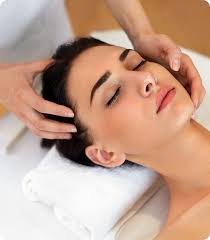
TMJ Massage
Suffering From TMJ?
Do you experience tension, pain, or discomfort in your jaw, neck, head, lower back, and/or hips?
Are headaches and migraines a chronic issue for you?
Or have you had any other injuries or conditions that caused a misalignment in your jaw?
Temporomandibular joint dysfunction (TMJ) describes a condition affecting the jaw and the muscles that move it. Common symptoms include jaw discomfort, chewing difficulties, and clicking or locking of the jaw. Living with the discomfort caused by TMJ can make it very challenging to focus and perform everyday activities without pain.
There are also other symptoms that may not seem related to TMJ at first glance. Headaches and migraines can sometimes be attributed to TMJ, along with tinnitus and other inner ear issues. Some people describe feeling restricted around the throat as one of the symptoms. And clients are often surprised to hear that lower back and hip discomfort may be related to TMJ dysfunction.
While some interventions—including dental procedures, Botox, and pain medication—can help with symptom reduction, they don’t always address the core issue. TMJ massage, on the other hand, has the potential to offer lasting relief. Working with our specialists at HeartSeed Massage and Wellness, you can experience respite from the pain caused by TMJ.
What Causes TMJ?
TMJ dysfunction is an incredibly common issue. The National Institutes of Health (NIH) estimate that 10 million Americans experience TMJ.¹ Sadly, many people with TMJ don’t even realize they have it—their symptoms may not appear connected to TMJ and doctors might even mislead them.
Several factors, including genetics, injuries, accidents, and prolonged head and neck strain (i.e., when looking at a computer or cell phone) can be the root cause of TMJ. But some studies also point to pollution and wearing a mask as contributing to jaw tension and pain.
Aside from environmental and physical factors, there is a lot to be said about mental health circumstances playing a role in the development of TMJ. Stress, depression, and anxiety have physiological consequences, causing our bodies to tighten and tense without us even being aware. And because elements like caffeine and other stimulants raise our cortisol levels, they can contribute to the cycle of stress- and anxiety-related TMJ.
Women Struggle With TMJ At Disproportionate Rates
It's been proven that women experience TMJ at higher rates than men.² Though studies done by the NIH have attributed this variation to hormonal differences, cultural factors might also contribute to gender discrepancies within TMJ cases. As women, we’re expected to quite literally bite our tongues, causing us to clench and grind in the absence of being able to fully express ourselves.
A big part of TMJ massage therapy is ensuring that you have the proper coping mechanisms and outlets for managing stress and emotions. By relieving tension with revolutionary techniques like Intra-oral massage and strategies for relaxation, you can lessen the physical, emotional, and cognitive effects that TMJ has on your life.
Intra-Oral And Other Massage Methods Can Significantly Reduce Symptoms Of TMJ
At HeartSeed Massage & Wellness, we are passionate about helping clients find long-term relief from TMJ. Our massage philosophy is entirely holistic, honoring the ways in which your physical, emotional, mental, and spiritual states are interconnected. Rather than taking a surface-level approach to your symptoms, we are invested in helping you get to the root of your TMJ dysfunction.
Once you have completed a thorough intake to help us better understand your symptoms and goals for treatment, your massage therapist will educate you about TMJ and how it’s related to the pain and discomfort you’re experiencing. You will learn about how other areas of the body—especially the spine and hips—are related to jaw pain, how underlying mental health issues may be contributing to your TMJ, and why massage is particularly beneficial for treatment.
From there, we will use the highly effective Intra-oral massage technique to alleviate some of the tension caused by TMJ. Intra-oral is a safe method in which your massage therapist will put on gloves and work the muscles inside the mouth that are contributing to your discomfort. If your massage therapist suspects that tension in other parts of the body is related to your pain, they will work on those areas as well. You might also learn take-home techniques for massage, stress reduction, and relaxation.
We are here to support your healing in every way we can, so if there are other specialists—including physical therapists or mental health providers—that may be able to further assist in your TMJ treatment, we will make sure you have the resources you need.
We have seen, firsthand, how effective a combination of Intra-oral massage and self-care techniques can be in relieving the tension, pain, and discomfort caused by TMJ. Some clients experience reduced jaw pain after just one session, while others may need ongoing treatment for symptoms to fully disappear. We are committed to significantly improving your discomfort level no matter what’s at the core of your TMJ. And working together, we can get you the relief you’ve been looking for.
Still Have Questions About If Massage Can Help With TMJ?
TMJ massage can’t actually target my symptoms.
Treatment for TMJ requires an open mind and curiosity about where your symptoms come from and how they might be related. Being resistant to massage therapy for TMJ might be making your pain and strain worse!
Even if you’re skeptical about how a massage therapist can meaningfully address your TMJ, we encourage you to give Intra-oral treatment a try for just one session. If you’re anything like our other clients suffering from TMJ, you will probably feel more space in your jaw than you’ve experienced in months or years.
What exactly is Intra-oral massage?
Intra-oral is a safe technique wherein your massage therapist will put on gloves and target the tight muscles that directly insert into the temporomandibular joint, as well as the surrounding muscles that may be contributing to discomfort. Working these muscles will open up space in the mouth, thereby reducing some of the tension around the jaw.
How long until I feel better?
The duration of treatment varies from person to person. A big part of finding relief depends on your level of commitment to the treatment process, sometimes requiring you to practice relaxation and stress reduction skills outside of massage appointments. In any case, if your symptoms are severe or distracting, you may want to plan on weekly massage sessions for a few months to meaningfully address pain and tension in your jaw.
Relax Your Jaw, Relax Your Body, Relax Your Mind
Our massage therapists use a holistic combination of relaxation, Intra-oral, and other massage techniques to help clients experience less pain and discomfort related to TMJ. To book with us, visit our contact page.





